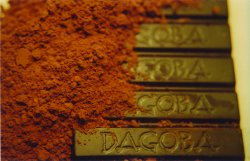 Candy and snack-food giant Hershey may have gobbled up Southern Oregon’s Dagoba Organic Chocolate, but the company will see few changes, according to founder and CEO Frederick Schilling.
Candy and snack-food giant Hershey may have gobbled up Southern Oregon’s Dagoba Organic Chocolate, but the company will see few changes, according to founder and CEO Frederick Schilling.

ASHLAND — Candy and snack-food giant Hershey may have gobbled up Southern Oregon’s Dagoba Organic Chocolate, but the company will see few changes, according to founder and CEO Frederick Schilling. Dagoba will stay in Ashland, its 40 employees will keep their jobs, and the 5-year-old company will continue adhering to the socially and environmentally conscious standards that have made it, and its award-winning chocolate, popular around the nation.
Schilling and Hershey representatives declined to provide details on the sale, including how much money changed hands and whether Hershey had guaranteed that Dagoba’s ethical standards would remain a priority. However, Schilling — who also declined to disclose the company’s 2005 sales figures — says promises weren’t needed because Hershey respected how the company operated, whether it was Dagoba’s use of renewable energy in the factory or chocolate-bar wrapping made from recycled paper. “They get us,” he says. “They appreciate what we do.”
The growth of the state’s boutique chocolate companies over the last few years has been both sweet and bitter for those involved: In October, Portland’s Moonstruck Chocolate Company announced it had opened a second café in California, bringing its total number of stores in three states to eight.
On the other hand, Jon Stocking, the now-former owner of Talent’s Endangered Species Chocolate, fought a nasty legal battle last year when he tried to reclaim ownership from Indianapolis business partners who bought a controlling interest in his company. Twenty-five employees lost their jobs when the new owners moved production to the Midwest.
Stocking says the sale of Dagoba was very different from his situation but worried that Oregon is losing one of its distinctive commodities: a locally owned and operated company with a strong philosophical vision.
In a letter to friends after the sale, Schilling described a sometimes torturous decision-making process — he backed out of the sale countless times, including the day that final paperwork was to be signed — which touched on that very issue. But, in the end, he felt there was only one way to follow what he described as his main goal of having an impact on the chocolate industry and it involved selling the company to Hershey.
“It’s up to us as business owners to use the power that we have to make change for the better. We have a responsibility,” he says. “For me, the more growth we have, the more impact we have.”
— Abraham Hyatt


